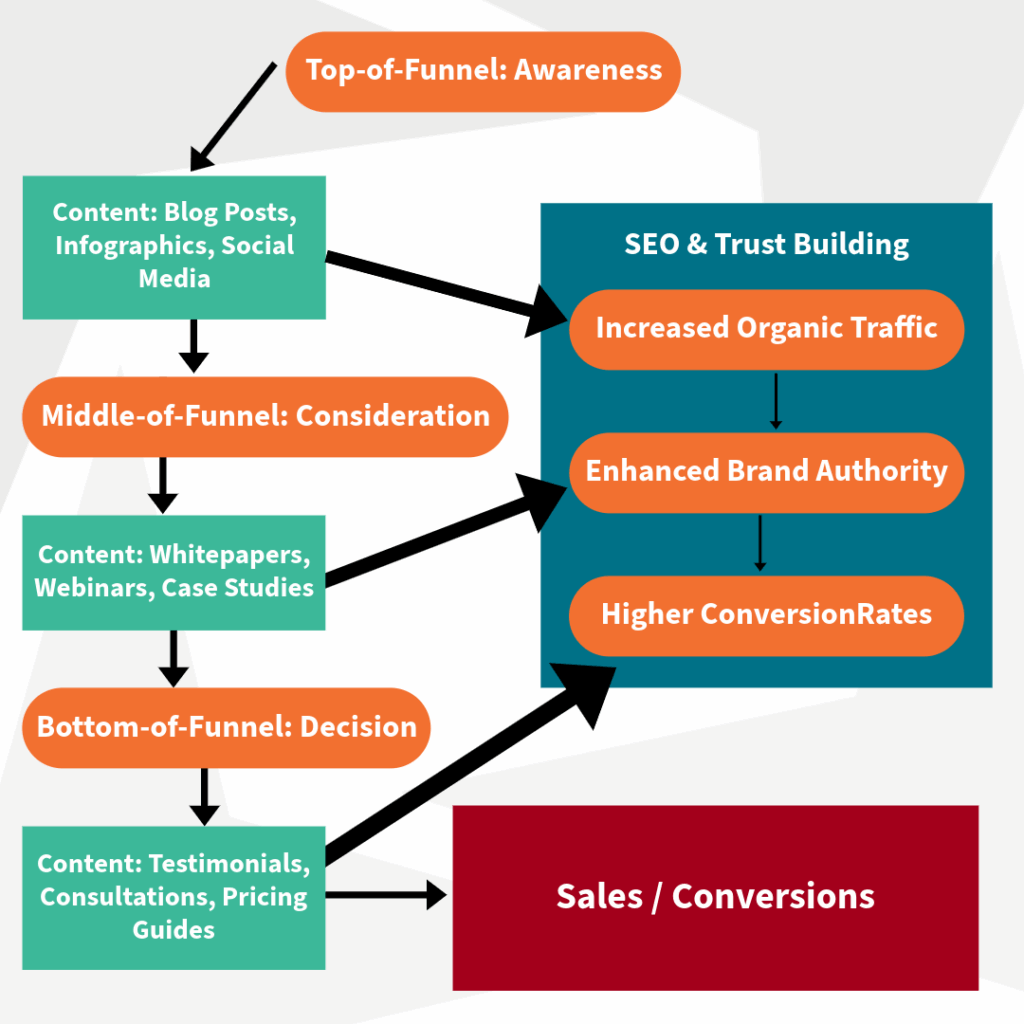The cybersecurity market is a dense jungle of complex solutions, technical jargon, and countless vendors. How do you, as a provider of vital cybersecurity solutions, cut through the noise and genuinely connect with potential clients? The answer, increasingly, lies not in aggressive sales pitches but in strategic content marketing. This isn’t just about brochures and product specs; it’s about education, trust, and demonstrating undeniable expertise. In this article, we’ll explore precisely why content marketing isn’t just a ‘nice to have’ but a crucial, indispensable tool for selling cybersecurity solutions in today’s digital climate.
1. Building Unshakeable Trust and Credibility: The Cornerstone of Cybersecurity Sales
Let’s be frank: when it comes to cybersecurity, trust is paramount. You’re asking businesses to entrust you with their most sensitive data, their operational continuity, and ultimately, their reputation. They’re not just buying a piece of software; they’re buying peace of mind. And you can’t buy peace of mind from a flashy advert.
This is where content marketing truly shines. By consistently producing high quality, informative, and insightful content, cybersecurity firms can position themselves as trusted authorities and thought leaders. Think of it like this: if you had a mysterious ailment, would you rather go to a doctor who only adverts heavily, or one who publishes insightful articles, speaks at conferences, and is known for their deep understanding of various conditions? The latter, right?
Content like whitepapers, detailed blog posts, industry reports, and webinars allow you to demonstrate your team’s profound understanding of current threats, emerging vulnerabilities, and the intricacies of digital defence. It’s about educating your audience, not just selling to them. Indeed, research from Semrush indicates that 84% of B2B marketers reported their content marketing-built brand awareness in the last year, clearly showing content’s powerful reach.
This consistent engagement and education is crucial, especially when you consider that B2B buyers now conduct an average of 12 online searches before even engaging with a vendor’s website, highlighting their extensive self-education. This proactive consumption of information underscores the necessity of having a rich, accessible content library.
As we highlighted in our 2025 article on cybersecurity marketing, “Buyers these days want proper insights before making a decision, and businesses that provide them with good quality information will stand out from everyone else trying to get their attention”. This approach moves you from being just another vendor to a trusted advisor. Google’s E-E-A-T (Experience, Expertise, Authoritativeness, Trustworthiness) guidelines, which are crucial for search visibility, heavily favour content from credible sources, further cementing the need for genuine expertise in your content.
Importantly, for a global industry like cybersecurity, providing multilingual or localised content can significantly broaden your reach and deepen trust, ensuring your expertise resonates with diverse audiences worldwide.
Visual Aid 1: The Trust Funnel – How Content Builds Relationships
Description: This flow chart illustrates how different types of content nurture prospects through the buyer’s journey, culminating in trust and advocacy. At each stage, content helps build the relationship, leading to a more informed and confident purchasing decision.
2. Educating a Diverse Audience: Demystifying Complex Cybersecurity Topics
Cybersecurity is, let’s face it, a highly technical field. For many business leaders – particularly those outside of IT departments – the terminology can be overwhelming. Concepts like ‘zero-day exploits,’ ‘phishing,’ ‘ransomware-as-a-service,’ and ‘DDoS attacks’ can sound like a foreign language. If your potential clients don’t fully grasp the threat, they won’t fully appreciate the solution<.
Content marketing provides the perfect platform to demystify these complex topics. Through clear, concise, and accessible language, you can break down intricate threats and explain how your solutions provide real-world protection. This isn’t about scaring people with fear-based messaging; it’s about empowerment through understanding. In fact, data shows 83% of B2B content focuses on building brand awareness and interest, highlighting the educational role of content.
Crucially, an effective content strategy also involves identifying the varying levels of audience awareness and technical understanding across different markets and buyer personas. Some audiences might need foundational explanations of basic threats, while others, perhaps in more digitally mature markets or with dedicated IT teams, require deep dives into advanced persistent threats or compliance nuances. Content allows you to cater to these different needs, offering explainer videos, easily digestible infographics, or ‘jargon-buster’ blog series for beginners, alongside in-depth whitepapers and technical guides for more advanced users. This tailored educational content helps your audience understand the risks, the benefits of proactive security, and ultimately, why your specific solution is the right fit. It builds confidence in their ability to make an informed decision, which is crucial in such a high-stakes area. With a reported 88% of cybersecurity breaches in 2024 caused by human error, educational content that addresses these human elements becomes even more critical.
3. Boosting Organic Visibility and SEO: Being Found When It Matters Most
When a business faces a potential cyber threat or realises they have a security gap, what’s the first thing they do? They Google it or now go to ChatGPT, don’t they? They’re searching for answers, solutions, and trusted advice. If your content isn’t optimised to appear at the top of those search results, you’re essentially invisible when prospects are actively looking for help.
Content marketing, when paired with a robust SEO strategy, ensures your brand is discoverable. By creating content that directly addresses the pain points, questions, and keywords your target audience is searching for, you increase your organic search visibility. This means more qualified leads finding you, rather than you having to constantly chase them. A recent report by CyberRisk Alliance from early 2025 emphasises that “engaging content that resonates” and “real-world insights and compelling use cases” are key to building meaningful connections with decision makers and boosting visibility.
Consider the impact of authoritative content: Google’s E-E-A-T (Experience, Expertise, Authoritativeness, Trustworthiness) guidelines heavily favour content from credible sources. For cybersecurity, this means content written by genuine experts, backed by data, and providing tangible value. This boosts your search rankings and signals to Google that your site is a reliable source of information, driving more relevant traffic.
Visual Aid 2: Content Marketing’s Impact on Sales Funnel
Description: This flow chart demonstrates how content marketing strategically supports each stage of the sales funnel, from initial awareness to final conversion, by leveraging different content types to build trust and authority, ultimately boosting SEO and driving sales.
4. Nurturing Leads and Accelerating the Sales Cycle: From Prospect to Partner
The decision-making process for cybersecurity solutions is rarely impulsive. It’s often a long, considered journey involving multiple stakeholders and a significant investment. Content marketing is perfectly suited for nurturing leads through this extended sales cycle, providing valuable information at every stage.
At the ‘awareness’ stage, your blog posts and social media content might introduce the realities of general cyber threats and the risks businesses face. As a prospect moves to ‘consideration,’ they might download a whitepaper on GDPR compliance, attend a webinar on cloud security, or review case studies showcasing successful implementations for similar businesses. These real-world examples become invaluable proof points, demonstrating how your solutions have effectively mitigated risks for others.
Finally, at the ‘decision’ stage, the focus shifts to direct action. Here, content should facilitate the next step, such as providing clear Calls-to-Action (CTAs) like “Get a Quote,” “Plan Your Implementation,” or “Sign Up for a Free Trial.” This isn’t just about informing; it’s about providing the right information at the right time to move them closer to a purchase. Personalised email nurturing campaigns, driven by content, can keep your brand top-of-mind, addressing specific concerns and building a relationship that transcends a mere transaction. AI-driven personalisation, which is a significant trend for 2025, can further refine content delivery, tailoring messaging to individual user behaviour and preferences, leading to higher engagement and shorter sales cycles. It transforms a cold lead into a warm, engaged prospect, significantly shortening the time to conversion.
5. Demonstrating ROI with Case Studies and Success Stories: Real-World Validation
In the cybersecurity sector, proof matters. Businesses need to see tangible results and understand how a solution has successfully mitigated risks for others. This is where case studies, testimonials, and success stories – powerful forms of content marketing – become absolutely indispensable.
These pieces of content move beyond theoretical benefits and provide concrete evidence of your solutions’ effectiveness. A well-crafted case study outlines a client’s initial challenge, the solution you provided, and the quantifiable results achieved (e.g., “reduced security incidents by 40%” or “achieved 99.9% uptime”). This provides a powerful form of social proof. TechnologyAdvice’s 2024 research highlights that customer case studies (63%), independent expert research (62%), and product reviews (59%) are the top three most important sources of information during the B2B tech buying process.
Integrating these real-world examples into your content strategy – whether it’s a dedicated ‘Success Stories’ section on your website, a downloadable PDF, or snippets within a webinar – provides the validation potential clients need to feel confident in their investment. It shows that your expertise isn’t just theoretical; it delivers measurable outcomes. For instance, companies with extensive use of AI and automation security tools saw a 2.2% reduction in breach costs in 2024, a statistic that could be effectively leveraged in a case study.
Conclusion: Content as Your Cybersecurity Foundation
In an industry where the stakes are perpetually high and the landscape ever-shifting, content marketing is more than just a promotional tool for selling cybersecurity solutions; it is, in essence, the very foundation of a successful cybersecurity business. It’s about building trust in an area where trust is absolutely non-negotiable. It’s about educating decision makers, many of whom aren’t technical experts, on complex threats and the vital protection your solutions offer.
With cyber threats continually on the rise – the average number of cyberattacks per organisation per week increased by a staggering 75% year-over-year in Q4 2024 – the demand for clear, credible information is only going to grow. By investing in a robust content marketing strategy; one that prioritises education, thought leadership, SEO + GEO, and demonstrable success, cybersecurity firms can cut through the noise, establish genuine authority, and ultimately, secure more businesses against the relentless tide of cyber threats.
So, if you’re in the business of digital defence, it’s clear: your content is an indispensable asset for building trust and driving growth across all your target markets.
Ready to strengthen your cybersecurity sales strategy with powerful content, including cutting-edge GEO (Generative Engine Optimisation) techniques to gain visibility in AI-driven search environments? Contact us today for expert insights and a tailored content marketing plan that truly protects and expands your business worldwide.
Husein is a seasoned digital marketing consultant renowned for driving growth for global brands through strategic expertise.













